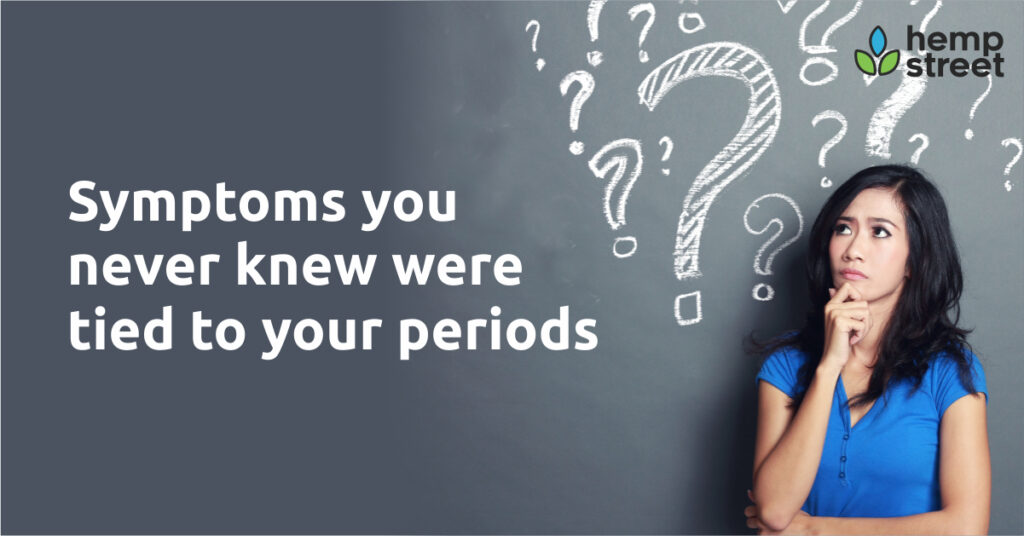What do moodiness, irritability, and bloating have in common? Quite often, it is your period. While you might be familiar with these typical symptoms that accompany your menstrual cycle, there are some lesser-known ways in which premenstrual symptoms (PMS) can manifest. After all, every woman is different, and a spike in hormone levels can be exhibited differently. So, you will understand six symptoms you never realized were related to your periods
Menstrual cycles can influence the body in more ways than just pain and bloating. Here are six lesser-known symptoms that can be related to your period:
1. Breathlessness
Where you are in your menstrual cycle can affect your breathing pattern. For instance, it is common to experience wheezing or shortness of breath right before your period is about to start. So, the next time you find yourself out of breath faster than usual, you can pin it on your hormones.
Your breathing rate rises in tandem with an increase in progesterone. As a respiratory stimulant, progesterone merely causes you to breathe more quickly.
2. Extra sore muscles
Do you have extra sore muscles after a leg workout or a bruise that takes unusually long to heal? If your period is set to arrive in a few days, it might be the doing of PMS. Recovery from muscle damage takes longer during the week before a woman’s period. However, women who are on a birth control pill can evade this side effect as the artificial hormones in the pill help recover at the same rate regardless of the time of the month.
During PMS Magnesium – As your levels of important hormones fall, so will your levels (or efficiency) of certain minerals. Estrogen can influence magnesium intake and utilization, and optimal amounts are essential for healthy muscles; low levels can induce pains, spasms, and cramps.
3. Inspired to give up a bad habit
This might come as a surprise because we usually attach negative connotations to PMS, but it can motivate you to quit a bad habit. In a study published in Biology of Sex Differences, researchers concluded that women were more successful at quitting smoking if they started at the end of their menstrual cycle. Your hormones have a bearing on how you make decisions regarding rewards. While the first half of your cycle may force you to give in to temptation, you’re more likely to stay resolute during the second half of your cycle.
According to science, estrogen, progesterone, serotonin, and cortisol levels influence both our emotions and our physical health. Poor lifestyle behaviors have been linked to potentially worsening symptoms.
4. Lower pain threshold
Pain receptors are more active before and during your period, making you more sensitive to pain than usual. Add to this, the severe discomfort brought along with menstrual cramps, and the situation becomes even more problematic. For some women, the pain can start a day or two before their period and usually lasts 48 to 72 hours, although this can vary.
Hormones such as estrogen and progesterone may affect pain perception in the brain. Low amounts of estrogen and progesterone can desensitize the pain system, causing a lower pain threshold.
5. Mouth and gum pain
The surge in estrogen and progesterone right before your period causes an increase in blood flow to the gums, which lowers your guard to fight against plaque formation. The plaque buildup can irritate the gums, eventually making them tender and swollen. Maintaining good oral hygiene can help dial back the discomfort by washing away any bacteria that might cause pain when you start menstruating.
Estrogen and progesterone levels rise soon before the menstrual cycle begins. These changes increase blood flow to the gums, making them more vulnerable to plaque and germs.
6. Depression
The fluctuation in estrogen and progesterone levels can cause a drop in the feel-good hormones – serotonin and dopamine, making you feel depressed or anxious during your period cycle. As unmanaged stress can worsen these symptoms, it becomes crucial to use deep breathing, exercise, proper nutrition, and sleep to calm your mind to combat depression.
Variations in progesterone produce a decrease in dopamine. Low progesterone, like low oestrogen, can produce mood swings and depressive symptoms. These hormonal alterations may result in mood disorders such as depression and irritation.
Conclusion
Much like these lesser-known symptoms, there’s a lot that you might not know about your periods. Raise your hands if you think of cramps as a regular part of your cycle, much like popping fast-relief painkillers to ease them. What you don’t realize is that a condition like endometriosis may be causing you severe cramps and over-the-counter medicines could result in more harm than help over time.
To be better prepared and aware of suitable ways to deal with unmanageable or painful periods, check out Hempstreet. You can even book an appointment with one of the in-house expert consultants to chart an efficient plan to tackle the not-so-normal symptoms of your menstrual cycle.
References
https://www.womenshealthmag.com/health/a19993249/weird-period-symptoms/
Published by Hempstreet




